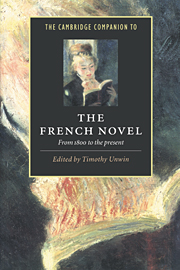Book contents
- Frontmatter
- 1 On the novel and the writing of literary history
- 2 Novels of testimony and the 'invention' of the modern French novel
- 3 Reality and its representation in the nineteenth-century novel
- 4 Women and fiction in the nineteenth century
- 5 Popular fiction in the nineteenth century
- 6 Decadence and the fin-de-siècle novel
- 7 The Proustian revolution
- 8 Formal experiment and innovation
- 9 Existentialism, engagement, ideology
- 10 War and the Holocaust
- 11 From serious to popular fiction
- 12 The colonial and postcolonial Francophone novel
- 13 The French-Canadian novel
- 14 Gender and sexual identity in the modern French novel
- 15 Postmodern Frenchfiction
- General bibliography
- Index
10 - War and the Holocaust
Published online by Cambridge University Press: 28 May 2006
- Frontmatter
- 1 On the novel and the writing of literary history
- 2 Novels of testimony and the 'invention' of the modern French novel
- 3 Reality and its representation in the nineteenth-century novel
- 4 Women and fiction in the nineteenth century
- 5 Popular fiction in the nineteenth century
- 6 Decadence and the fin-de-siècle novel
- 7 The Proustian revolution
- 8 Formal experiment and innovation
- 9 Existentialism, engagement, ideology
- 10 War and the Holocaust
- 11 From serious to popular fiction
- 12 The colonial and postcolonial Francophone novel
- 13 The French-Canadian novel
- 14 Gender and sexual identity in the modern French novel
- 15 Postmodern Frenchfiction
- General bibliography
- Index
Summary
Writing on war did not begin with the twentieth century. Far from it: the whole tradition of epic can be defined as, precisely, literature of war. Nevertheless it is only in our own century that it has expanded to become a major genre. There are of course nineteenth-century antecedents in French: best known, La Chartreuse de Parme, where Stendhal takes Fabrice del Dongo on a gratuitous excursion to Waterloo. But these pages, famous though they are, amount to less than a tenth of a very long novel. Zola's La Débâcle (1892) is the most important individual nineteenth-century novel devoted to the theme of war, taking in its sweep both the Franco-Prussian War and the Commune which followed. La Débâcle has acted as a seminal work, since many of the typical incidents of First- and Second-World-War narratives appear, if only in embryo, in its pages, together with the dominant theme of war as confusion, a humiliating shambles. And at the same time as presenting the war as experienced by individual characters, Zola succeeds in incorporating into his fiction a bird's eye survey of the conflict, almost from a historian's viewpoint, in a way no writer was to emulate until Jules Romains in the late 1930s. His description of the shattering defeat of the French armies at the hands of the Prussians prefigures, precisely, the even greater debacle of May-June 1940.
- Type
- Chapter
- Information
- The Cambridge Companion to the French NovelFrom 1800 to the Present, pp. 161 - 178Publisher: Cambridge University PressPrint publication year: 1997

